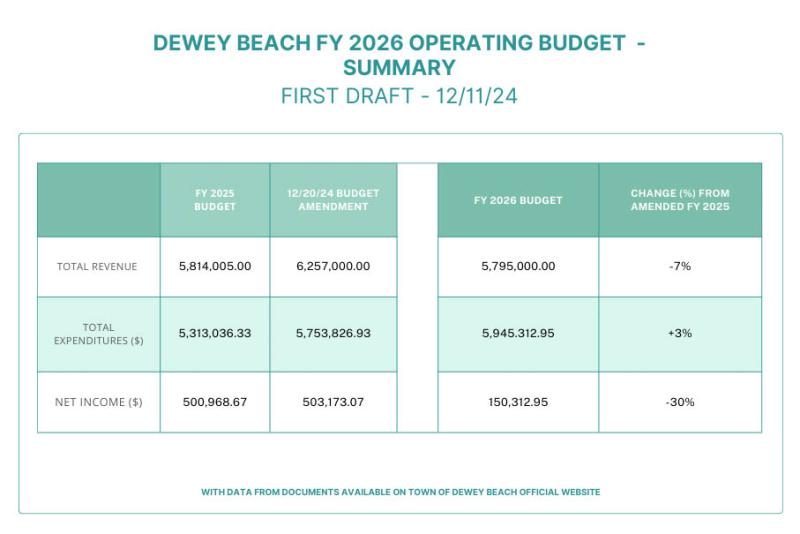The Dewey Beach Finance Committee discussed the first draft of the town’s fiscal year 2026 budget at a meeting Dec. 16.
Though the final budget, which will be approved by the end of March 2025, will likely look very different from the first draft, accounting clerk and HR Supervisor Sheena Hall said the draft serves as a starting point.
The current draft anticipates a net loss for fiscal year 2026, so the finance committee is brainstorming ways to balance the budget and make up for those losses.
“Anyplace [where] we can sharpen our pencils on the expenses is a good first step,” said committee Chair Iris Curtis.
The draft budgets for the town to spend about $5.95 million in FY 2026, compared to the $5.3 million budgeted for FY 2025 – an anticipated 12% increase in spending from this year to next.
In contrast, the draft budgets for the town to bring in $5.795 million in revenue in FY 2026, compared to the budgeted $5.81 million for FY 2025 – about a 0.03% decrease in revenue from this year to next.
Notably, the draft indicates an increase in FY 2026 for salary/wages and employee benefits for both full-time and seasonal employees, including those working in the police department and public safety, streets and maintenance, parking enforcement, building and code enforcement, and beach patrol.
“Those expenses have increased to try to keep up with the surrounding towns,” Town Manager Bill Zolper said.
Dewey Beach’s lifeguards, for example, are the lowest paid between Fenwick Island and Lewes at $17 an hour, with Delaware State Parks paying $20 an hour and Rehoboth proposing $21 an hour. Dewey proposes to raise the pay to $19 an hour for the coming year.
Similarly, the town is proposing to increase parking ambassadors’ pay to $19 an hour.
About $1.9 million of the town’s incoming revenue comes from parking, Zolper said, so without parking ambassadors educating folks about the parking in the town, much of that revenue will be lost.
At this point in the 2025 fiscal year, the town’s expenses are higher than projected. This, Hall explained, is because the revenues were also higher than projected, and with more grants coming in, the town was able to spend more money.
Thus, Hall is submitting an amended FY 2025 budget Dec. 20 for commissioner approval. The amendment takes into account all major revenue streams for the fiscal year, with the last being the accommodations tax, which was due in October.
The amendment budgets a net gain of more than $500,000 for FY 2025. In comparison, the current FY 2026 draft budgets a net loss of more than $150,000.
The finance committee will be meeting several times before the final FY 2026 budget is due, including for a special budget workshop in January. Members will use that time to revise and balance the budget as best they can.
Ellen McIntyre is a reporter covering education and all things Dewey Beach. She graduated with a bachelor’s degree in journalism from Penn State - Schreyer Honors College in May 2024, then completed an internship writing for the Pittsburgh Post-Gazette. In 2023, she covered the Women’s World Cup in New Zealand as a freelancer for the Associated Press and saw her work published by outlets including The Washington Post and Fox Sports. Her variety of reporting experience covers crime and courts, investigations, politics and the arts. As a Hockessin, Delaware native, Ellen is happy to be back in her home state, though she enjoys traveling and learning about new cultures. She also loves live music, reading, hiking and spending time in nature.






















































